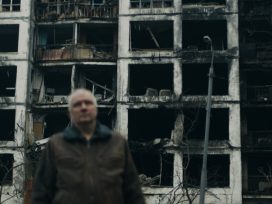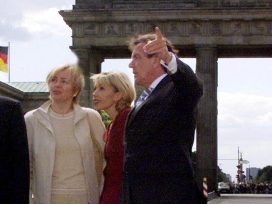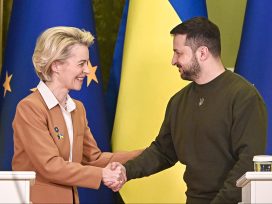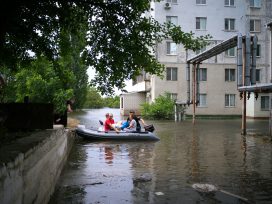Different people
After fleeing war-ravaged Kharkiv, many have found refuge and hospitality in Poltava. How does it feel to be an internally displaced person in one’s own city of birth?
‘Day twenty-seven.’
‘The thirty-second day is drawing to a close.’
I remember 24 February. As for the rest, it’s all a blur. A siren. A hallway. The rule of two walls. One for the blast, the other for its fragments.
The elevator is out. Walking downstairs is a whole other story for my father. For my mother, too. The last flight has no railings. I hadn’t noticed that. My father halts.
It thuds nearby, loud. No pauses. Leaving the building is frightening. Frightening, too, to stay there. We leave. Outside, the explosions are even stronger.
A house has lost its corner, living rooms exposed. A hanging chandelier, a nearby wardrobe. It’s stage design – of warfare.
A marketplace called Fairytale. It’s gone. Fairytale is no more. The Class supermarket, windows broken. I don’t take pictures, I just memorize. We are leaving Kharkiv, the memory of which imprints in this shape.
I wait for a release, to unclench inside. Here’s the ring road. We turn onto another road. First village. The same feeling as when I walked through the city: at any moment …
We’re on the border between regions. A fuel station. We stay there for a long time. I step out. It’s spring here. In Kharkiv it was winter. I have escaped.
There’s a queue at the regional executive committee.
‘Cat?’
‘Animal.’
‘Putin?’
‘War.’
‘Death.’
We are playing word association.
‘Airplanes?’
‘Putin.’
‘Bombs?’
‘Putin.’
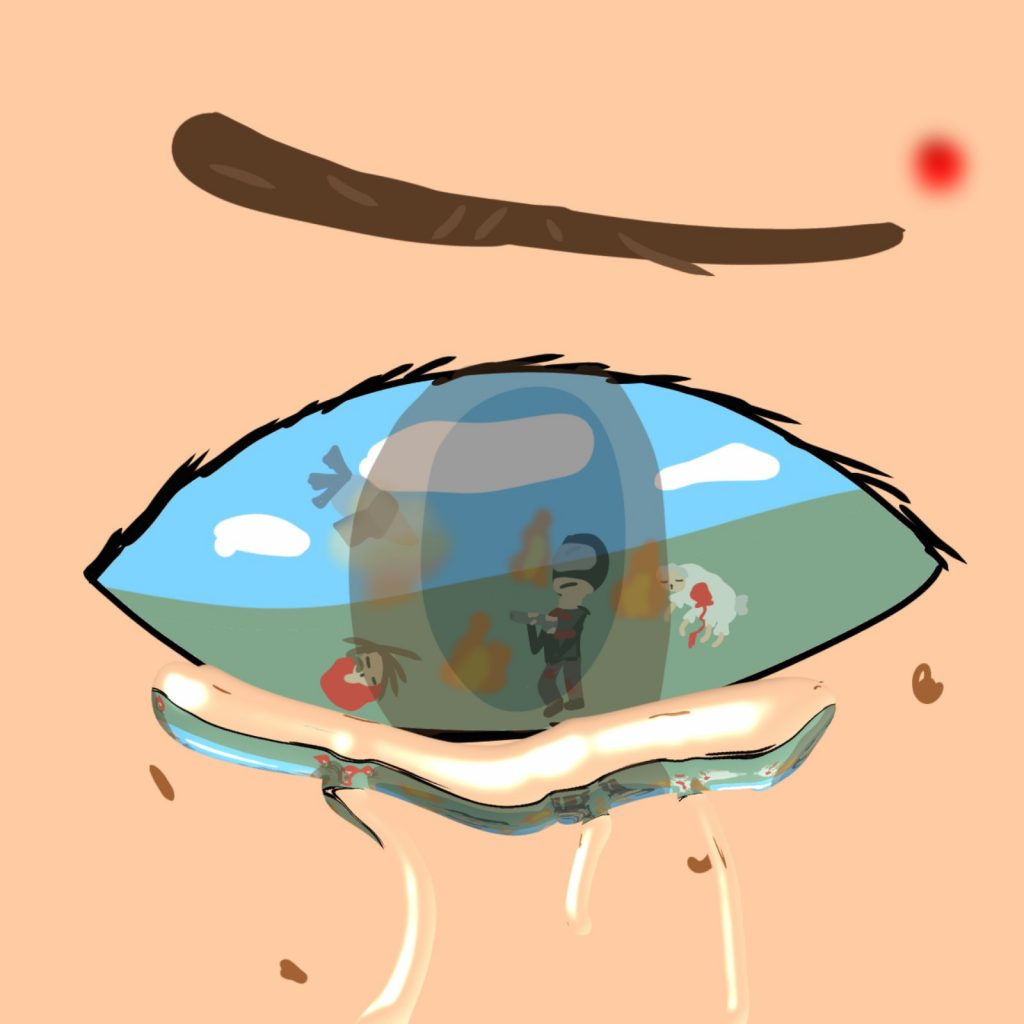
Image by Nadiya, Andrei Krasniashchikh’s 10-year-old daughter.
At the end of the line, a young woman faints. They help her up and lead her away.
In Ukraine, a displaced person. A refugee abroad.
Poltava is my childhood city. I was born here. My relatives live here. And yet, I am displaced.
The long queue for welfare is Noah’s Ark. Two thousand hryvnia each; pensioners receive three. There are glamour girls among us, as if from a fancy restaurant. The class feeling flares up and fades away. Here, we are all alike. At least as far as our facial expressions go.
The regional executive committee is a nest of vipers. But not today. Today, people are different. I have never experienced an attitude like this. Not anywhere. So delicate. As if we are made of crystal and can be broken. We, too, are different people now.
Liudochka is in Lviv. She tells similar stories. She’s waiting in a hospital, her husband in surgery. Someone approaches, brings her water. Offers her a bag of food.
‘No, thank you, we’ve got some.’
‘Take it, keep it for later.’
Uneasy.
Uneasy is the self-perception of the displaced. Uneasy in someone else’s cosy apartment. Uneasy in the gym where a hundred people have gathered. Uneasy about receiving so much attention as a perfectly healthy adult.
Uneasy admitting that you’re displaced now. To recognize it.
Even more uneasy is the fact that you’ve gone, but someone else stayed behind. Friends. Relatives. You’re in paradise. You even read news reports differently now. Before, in hell, they came across as more optimistic.
‘Good morning! How are you?’
‘Good morning.
I’m alright.
No heating.
No lights.
No Internet.’
Not a tourist trip; a longer journey. We don’t have a change of clothes. We rummage for our sizes.
‘Don’t take any spares. Someone else might need them.’
Before, we would have helped ourselves to an armful of stuff. For free.
Depeche Mode plays on my phone: Walking in My Shoes. I’m grateful to the person in whose shoes I walk now.
The displaced can be recognized by their backpacks and the plastic bags they’re carrying, filled with humanitarian aid. Also, by their rapid pace. The displaced move fast: from explosion to explosion.
A queue at the supermarket. It’s apparent straightaway who is local and who isn’t. The local has a range of products in his cart: fermented milk (not just milk), a cumin roll, a can of herring. The displaced carries a starter kit: white bread, pasta, canned meat. Potatoes and onions.
Sometimes it’s the other way around. Chips, sweets, Coca-Cola – this is a displaced person, too.
We call a plumber. He’s the neighbour from downstairs. He fixes everything, explains how to use it.
‘Thank you very much. How much do we owe you?’
‘How much do you pay for this apartment?’
‘Nothing.’
‘So, nothing to me, too. You already said thank you.’
The apartment belongs to a childhood friend who is in Italy now.
I thought that once I broke free, I’d walk a lot. Just walk everywhere. But I sit at home and listen hard. To everything. The rustling of tyres outside – airplanes. A refrigerator door slamming. Stomach growling loudly.
My wife and daughter, Lena and Nadya, have been here for several days. They say this will pass.
At five in the morning the upstairs neighbour drops something. Nadya and Lena leap up and run. As do I.
The displaced arriving from the Donbas in 2014: impudent and noisy. Now I’m the impudent and noisy one. Except, also quiet.
Others see us. They encourage us. They sympathize and comfort us. But we are, in truth, runaways. From the war.
A volunteer from Lviv hands us some medicine: ‘Hang on in there. Everything will be okay.’
He’s heading to Kharkiv. To the war.
I run into an ophthalmologist. A hairdresser. A teacher I once counselled. Acquaintances that I hadn’t seen in Kharkiv for years. Half of Kharkiv is in Poltava. The other half – all the destroyed buildings – have stayed behind.
The cat has started to purr again. She hasn’t purred for a month. She just mewed. Like the rest of us.
Children who get pulled out from basements come to life first. We follow their example and that of the animals. But the war is far from over.
And it won’t be over when it ends. It will be carried within.
My daughter says: ‘We will remember the war as something ancient, historical. Something we’ve gone through; we’re going through.’
I shave off my beard bit by bit over the month. Every day. A shorter moustache. Off the cheeks. The temples. A bit from the chin. I’ll encounter myself soon.
We scream in our sleep every night. We don’t remember those dreams. Most often we shout ‘No!’
Not everything that happens gets revealed these days. A great deal is kept secret. I don’t know what’s happening in me, either. And what I do know, I hardly disclose. After victory, all these things will be divulged.
I understood where this writing style comes from. It’s the style of news channels on Telegram. That’s all I’ve read since the beginning of the war. Facts and the state of things. We will analyse and reflect later, after the victory. Right now, others analyse and make plans for us. We can only feel and get through it.
Classes have resumed. Yesterday I sent a message to the students.
In the newsfeed today:
‘A third-year student at the V. N. Karazin Kharkiv National University, Vadym Pavlenko, perished along with his father while trying to flee Izyum.’
And a photograph. I catch a glimpse of him for the first time. We’d all been meeting online until now, with avatars.
It was the second time he’d signed up for one of my courses. He attended every lecture. He asked questions.
Published 18 August 2022
Original in Ukrainian
Translated by
Tanya Breslin Zaharchenko
First published by Ukrainska Pravda, 31 March 2022 (Ukrainian version); OpenDemocracy (English version); Eurozine (edited translation)
© Andrei Krasniaschikh / Ukrainska Pravda / Eurozine
PDF/PRINTIn collaboration with
In focal points
Newsletter
Subscribe to know what’s worth thinking about.
Related Articles

On top of housing, work and schooling, Ukrainian refugees with HIV face an additional, urgent difficulty: how to access the antiretroviral medicines they need to suppress the virus. In Poland, they face a particular stigma, causing many HIV positive refugees to conceal their health status.
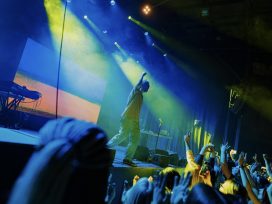
Growing numbers of Russians are fleeing the stifling atmosphere that has settled across the country’s political and cultural realms. Nowhere is this more tangible than in the world of popular music – once a shared cultural space between the two nations, now just another battleground in Russia’s war against Ukraine.

